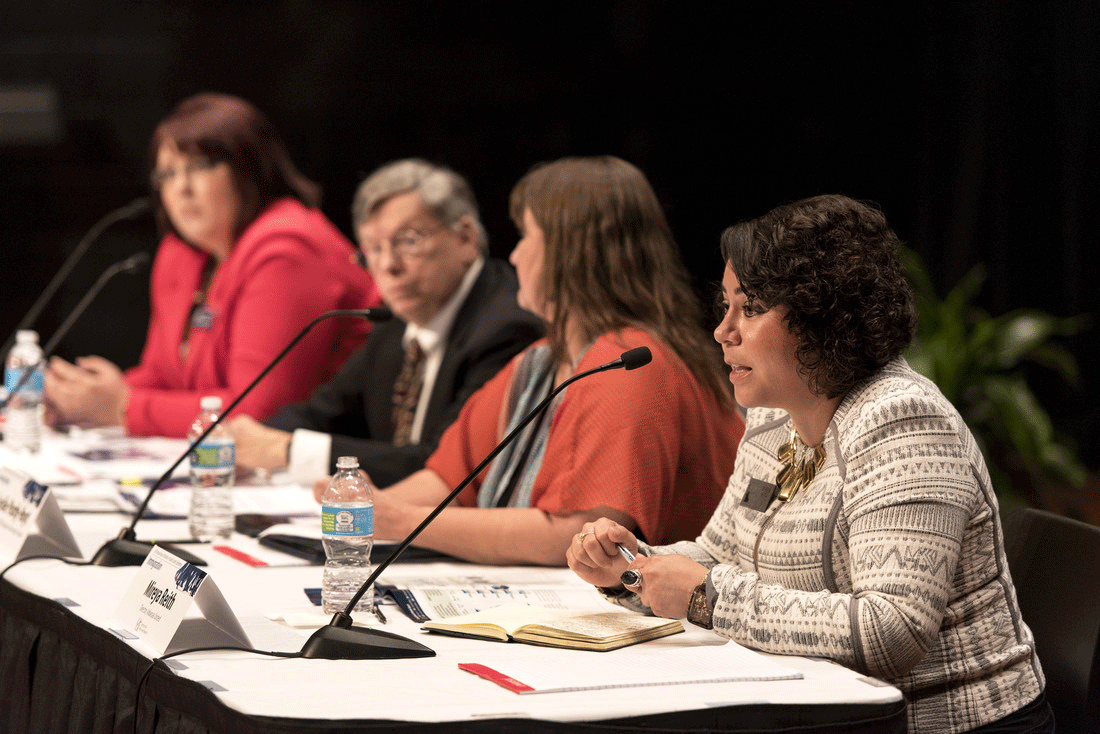Experts discuss immigration in Pulaski County
Dr. Leslie Purdy-Hoyt had never met a Hispanic person before she started working as an English-as-a-second-language instructor in 1998.
“I was so naïve. I had no idea there were even undocumented students in my classroom,” said Purdy-Hoyt, director of Hall High School programs for immigrant students in Little Rock.
Now she has worked with hundreds of immigrant children, many of whom are struggling to stay in the country with their families, gain an education, and pay off debt.
“There seems to be no rhyme and reason, in my experience, to the kids who are being deported and the kids who are staying,” she said. “I can have two students that come with seemingly the same criteria. One will get a letter of deportation. The other is on the pathway to legal residency. It is so convoluted that I can’t keep up with it.”
Purdy-Hoyt discussed immigration issues in Pulaski County during the April 13 Racial Attitudes in Pulaski County Conference at the University of Arkansas at Little Rock.
The conference is held annually to discuss the results of the annual Racial Attitudes in Pulaski County survey, which is conducted by the Survey Research Center at the UALR Institute of Government.
UALR’s Institute on Race and Ethnicity organized the conference. Institute Director Dr. John Kirk moderated the discussion of panelists, which included Purdy-Hoyt, Dr. Andre Guerrero, president of the Little Rock chapter of League of United Latin American Citizens; Mireya Reith, co-founder and executive director of Arkansas United Community Coalition; and Maricella Garcia, director of Catholic Immigration Services in Little Rock.
Purdy-Hoyt’s students face a variety of situations. Some are U.S. citizens, while their parents remain undocumented. Some students remain in the country alone after their parents were deported. Some of her students have lived in the U.S. since they were small children and do not understand why they might be sent back to a country they do not remember.
“Many of our undocumented kids have been in the country since they were toddlers, so when someone tells this child you should go back to their country, it is kind of a ridiculous statement. The United States is the only country this child knows,” Purdy-Hoyt said.
When she started at Hall High School in 1998, there were 60 ESL students. There are now 290 students in that school’s program, which accounts for 25 percent of the student population. In the past, most of Purdy-Hoyt’s students came from Mexico, but now many are arriving from Central America.
“Previously, students coming into the U.S., either legally or illegally, would be mostly educated through at least the eighth grade. Now we are receiving kids with second- and third-grade education,” she said.
Her students from Central America often arrive with greater amounts of debt than those from Mexico.
“Where the children from Mexico have paid one or two people to get them across the border, the kids from Central America have sometimes paid as many as six different people to help them get across the border, sometimes some pretty unsavory characters. So when they get here, they can be upwards of $10,000 in debt,” she said.
As an educator, Purdy-Hoyt’s goal is to help her students get into college, but that can be a daunting goal. Students who are not U.S. citizens face expensive out-of-state tuition with little options to pay for it.
One of Purdy-Hoyts’s students is an honor student who dreams of being a nurse. She is in the country legally under deferred action. The girl maintains a job, pays taxes, volunteers in the community, and is in the top 5 percent of her class.
“She has lived here since she was 2,” Purdy-Hoyt said. “In order to go to college, she is going to have to pay out-of-state tuition. She is not eligible for any Pell grants. She is not eligible for any federal loans. She is not eligible for any scholarships that are federally or state funded, even though she far out-qualifies most of the people who will get them.”
Mireya Reith, director of Arkansas United Community Coalition, said there are more than 5,000 students in Arkansas who have been granted “deferred action for childhood arrivals,” a program President Barack Obama announced in 2012 that allows certain undocumented immigrants who entered the country before their 16th birthday to receive a work permit and exemption from deportation.
“When people have an opportunity, they will come forward and do it,” Reith said. “At this point, it’s very hard for those kids to find a way to go to school because they are paying a much higher rate of tuition, and private scholarships are few and far between. That is an area that both at a state level and a national level needs to really be worked on.”
There have been three unsuccessful attempts since 2005 to pass a bill that would allow in-state tuition for undocumented immigrant students in Arkansas.
UALR Chancellor Joel Anderson said Arkansas is missing an opportunity to bolster the state’s workforce by not offering in-state tuition to students.
“The states that have done this will have stronger workforces in the future,” Anderson said. “They will have workers who are more productive and who are less dependent on the rest of society.”
In the upper right photo, panelists discuss immigration during the Racial Attitudes in Pulaski County Conference. Panelists include, from left to right, Maricella Garcia, director of Catholic Immigration Services in Little Rock, Dr. Andre Guerrero, president of the Little Rock chapter of League of United Latin American Citizens, Dr. Leslie Purdy-Hoyt, director of Hall High School Programs for Immigrant Students, and Mireya Reith, co-founder and executive director of Arkansas United Community Coalition. Photo by Lonnie Timmons III.
